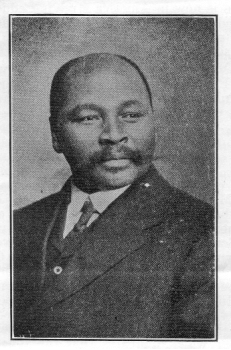John Dube
 Oberlin College played a significant role in nurturing John Langalibalele Dube, a writer and civil rights leader who worked against the oppressive apartheid system in his native South Africa. Dube established an organization that many years later helped his countrymen. In later years, many would compare Dube to his mentor, fellow civil rights leader, oratorical powerhouse, and educator Booker T. Washington.
Oberlin College played a significant role in nurturing John Langalibalele Dube, a writer and civil rights leader who worked against the oppressive apartheid system in his native South Africa. Dube established an organization that many years later helped his countrymen. In later years, many would compare Dube to his mentor, fellow civil rights leader, oratorical powerhouse, and educator Booker T. Washington.
Dube enrolled in the Oberlin Preparatory Academy, the pre-college division, at the age of 16 in 1888. The son of one of the first ordained pastors of the American Zulu nationals, Dube entered the United States under a sponsorship with Rev. William Wilcox, a missionary and educator. To pay for his studies, Dube worked at that College and at a local printing firm and attended the Second Congregational Church, all were experiences that would greatly influence his world outlook.
While a student at Oberlin, Dube studied the sciences, mathematics, and classical Greek works, and practiced his oratorical skills. He stayed in Oberlin until 1890.
Back in his native South Africa, Dube established one of the first schools of higher learning for the indigenous peoples, the Zulu Christian Industrial School (1901), later renamed the Ohlange Institute. The school sought to provide students with an understanding of Zulu culture, academic learning, and its application in labor, much like the teachings of Washington.
He also led a public life as an educator, orator, writer, newspaper editor, and an international civil rights leader. He acquired much of these skills while living and studying in Oberlin. Many years later, the African National Congress, of which he was a founding president, evolved into a political organization and became the primary political force responsible for overthrowing the apartheid system in South Africa.
Dube often traveled to the United States, finding encouragement at Oberlin College, and inspiration from Washington’s Tuskegee Institute and the principles of labor and self-reliance he championed.
Today, interested persons can explore Dube’s life further, thanks to a 55-minute documentary by Cherif Keita, professor of French and Francophone literature at Carleton College. The film, Oberlin-Inanda; The Life and Times of John L. Dube, has two screenings in Oberlin and earned an array of film honors.
Sources: Electronic Oberlin Group, John L. Dube: A Bibliographical Sketch